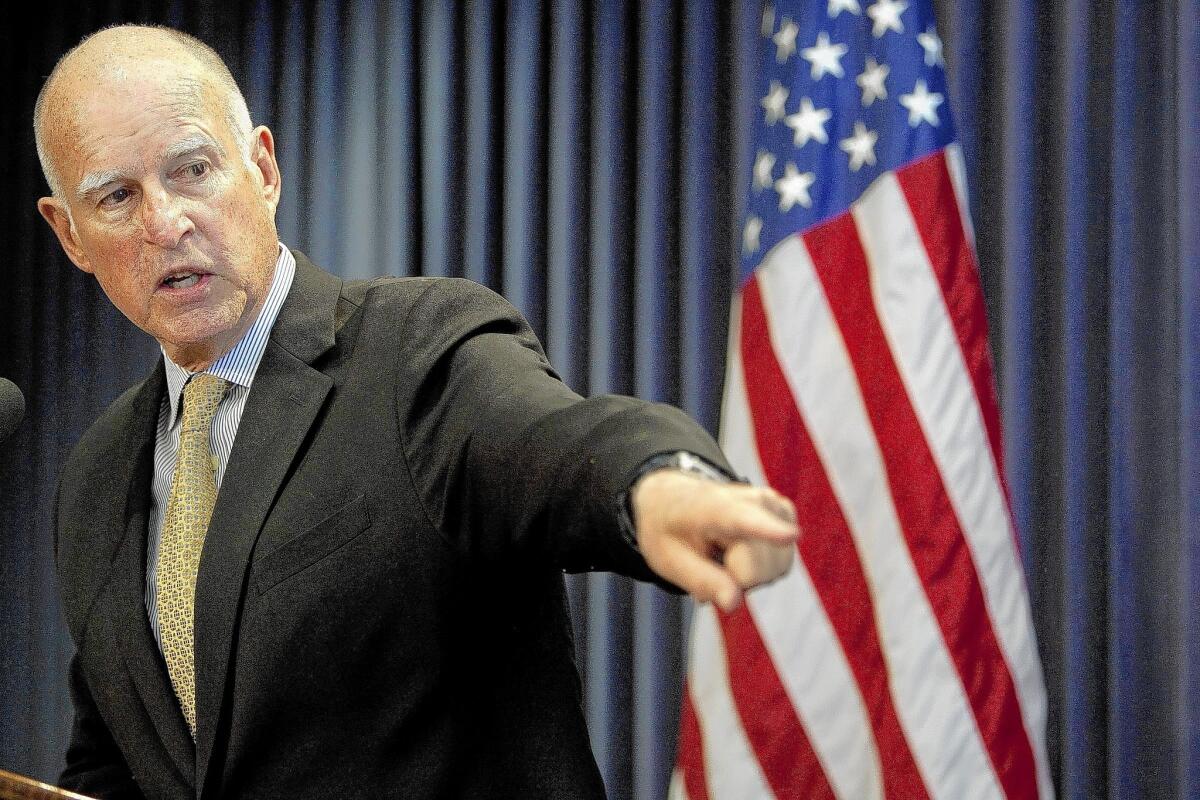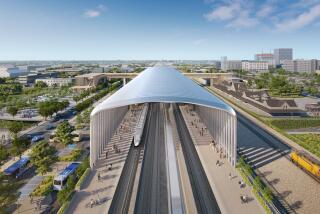Bullet train funding is bargaining chip in state budget debate

As the biggest cheerleader for California’s $68-billion bullet train, Gov. Jerry Brown has battled lawsuits from angry landowners and intractable opposition from Republicans. And two years ago, the project barely survived a vote in a Legislature controlled by Brown’s fellow Democrats.
Now the governor faces another challenge as he tries to secure new funding from pollution fees to keep the project rolling. His effort is emerging as one of the most hotly contested elements of this year’s budget, providing leverage to Democratic lawmakers who have their own eyes on the money.
------------
For the Record
State budget: An article in the May 31 LATExtra section about bullet train funds being used as leverage in state budget negotiations said Alex Jackson was a lawyer for the National Resources Defense Council. The organization is the Natural Resources Defense Council.
------------
“We all know the governor wants that high-speed rail,” said Sen. Jim Beall (D-San Jose). “It becomes a bargaining chip.”
The give-and-take is about cash generated by the state’s cap-and-trade program — the first of its kind in the country — that requires polluters to pay for the right to release greenhouse gases into the atmosphere. Brown wants to spend a third of the fees from that program on the bullet train every year, which could total billions of dollars over the next several years.
But public support for high-speed rail has faded since voters approved the project six years ago, and lawmakers are wary of Brown’s plans. By law, cap-and-trade revenue is to be used for reducing greenhouse gas emissions, and legislators are skeptical that spending money on the bullet train is the best way to get the fastest, most cost-effective results.
Construction near Fresno still hasn’t started, and the route from Los Angeles to San Francisco won’t be operational until 2029 — almost a full decade past the deadline for reducing emissions to levels last seen in 1990.
“I’m quite unsure that laying down track in the middle of the Central Valley will meet immediate carbon goals,” Sen. Kevin de León (D-Los Angeles) said. But Brown is “fixated on building a legacy for himself with high-speed rail.”
Like many of his Democratic colleagues, De León wants high-speed rail in California, but he’s not willing to give the governor all the money he wants.
Instead of providing 33% of cap-and-trade revenue for the bullet train, Senate Democrats are offering 20%. That money would be shared with other inter-city rail projects such as one adding tracks to the Metrolink line between San Bernardino and Los Angeles.
“I’d like to see an integrated, California-wide system of public transit rail projects, as opposed to one rail project,” Beall said.
Assembly Democrats jettisoned the multi-year funding plan sought by Brown. Although they support borrowing billions more for the project, their own proposal would force high-speed rail to compete for a portion of $400 million in cap-and-trade funding in the next budget.
“We have to be very careful with how the money is handled,” said Alex Jackson, a San Francisco lawyer for the National Resources Defense Council. Dedicating a portion of the money to the bullet train by “writing a blank check to the High-Speed Rail Authority” could increase legal risks for the cap-and-trade regimen.
The California Chamber of Commerce sued over the program, calling it an unconstitutional tax. A Superior Court judge ruled in the state’s favor in January but cautioned that the revenue must be spent to further the program’s environmental goals. The decision has been appealed.
Legislative analysts have expressed similar concerns, saying high-speed rail is not the most cost-effective or quickest way to reduce pollution. But so far, Brown has not wanted to allocate less money for the bullet train than he originally proposed.
“We think one-third is the right number to get the project moving,” said Michael Cohen, director of Brown’s Department of Finance. Administration officials have also dismissed legal concerns.
The fate of the cap-and-trade money is particularly important because voter-approved bonds for the rail network have been blocked by lawsuits, stalling a major source of funding. The state expects an appellate court to rule in the case within the next three months.
In the meantime, Brown will be negotiating funding with unenthusiastic Democratic lawmakers as they approach a June 15 deadline for passing a budget.
Assembly Speaker Toni Atkins (D-San Diego) recently noted that support for the bullet train had diminished. “Certainly it is the governor’s major priority, but I think we have a little bit of work to do on that,” she said.”
Senate leader Darrell Steinberg (D-Sacramento) told reporters the train would be “a much tougher sell” than it was two years ago, when he shepherded the project through a tight vote in the Senate. He said Brown should be willing to compromise, given the tough budget decisions lawmakers have made to support his financial goals.
“We have more than lifted to meet the governor’s agenda,” Steinberg said. “It’s time he does a little lifting to meet our priorities.”
Horse trading over the bullet train could extend beyond cap-and-trade funding and into the rest of the budget. Steinberg wants $378 million to pay for preschool for all 4-year-olds from low-income families — a scaled-back version of his previous $1.5-billion plan for expanded preschool. Brown, however, has balked at the cost.
If Brown struggles to line up enough Democratic support for the bullet train, it’s unlikely he’ll win any from Republicans, who are united in their opposition to the project and to supporting it with cap-and-trade dollars.
“It’s an inappropriate and probably unconstitutional use of those resources,” said Assemblyman Jeff Gorell (R-Camarillo), vice chair of the Assembly budget committee. “The governor needs to give up on high-speed rail.”
More to Read
Start your day right
Sign up for Essential California for news, features and recommendations from the L.A. Times and beyond in your inbox six days a week.
You may occasionally receive promotional content from the Los Angeles Times.







